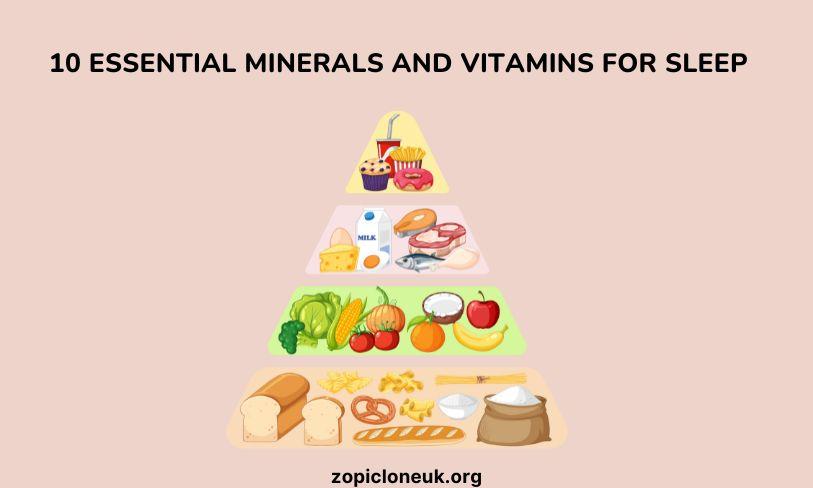
10 Essential Minerals and Vitamins for Sleep:- Achieving a restful night’s sleep is essential for overall health and well-being. While various factors contribute to sleep quality, ensuring adequate intake of certain minerals and vitamins can significantly improve your ability to fall asleep and stay asleep. Here are ten essential minerals and vitamins that play a crucial role in promoting healthy sleep patterns.
Contents
- 0.1 1. Magnesium
- 0.2 2. Calcium
- 0.3 3. Vitamin D
- 0.4 4. Vitamin B6
- 0.5 5. Zinc
- 0.6 6. Iron
- 0.7 7. Potassium
- 0.8 8. Vitamin C
- 0.9 9. Vitamin E
- 0.10 10. Omega-3 Fatty Acids
- 0.11 FAQ
- 0.11.1 1. Can I take supplements to improve my sleep quality?
- 0.11.2 2. How long does it take for these nutrients to improve sleep?
- 0.11.3 3. Can a balanced diet replace the need for sleep supplements?
- 0.11.4 4. Are there any side effects of taking these supplements?
- 0.11.5 5. Can children take these supplements for better sleep?
- 0.12 Conclusion
- 1 Author Details
1. Magnesium
Magnesium is a vital mineral that supports over 300 biochemical reactions in the body. It helps regulate neurotransmitters, which send signals throughout the nervous system and brain. Magnesium deficiency can lead to sleep disturbances, as it plays a crucial role in maintaining GABA (gamma-aminobutyric acid) levels, a neurotransmitter that promotes relaxation and sleep.
Food Sources:
- Leafy green vegetables (spinach, kale)
- Nuts and seeds (almonds, pumpkin seeds)
- Whole grains (brown rice, quinoa)
- Legumes (black beans, chickpeas)

2. Calcium
Calcium is essential for the production of melatonin, the hormone responsible for regulating sleep-wake cycles. A deficiency in calcium can result in difficulty falling and staying asleep. Additionally, calcium helps the brain use the amino acid tryptophan to produce melatonin.
Food Sources:
- Dairy products (milk, yogurt, cheese)
- Leafy greens (broccoli, collard greens)
- Fortified plant-based milks (almond, soy)
- Fish with bones (sardines, salmon)
3. Vitamin D
Vitamin D, often referred to as the “sunshine vitamin,” is crucial for overall health, including sleep regulation. It helps maintain circadian rhythms and supports the body’s ability to produce melatonin. Low levels of vitamin D have been linked to sleep disorders and poor sleep quality.
Food Sources:
- Fatty fish (salmon, mackerel)
- Fortified dairy and plant-based milks
- Egg yolks
- Mushrooms exposed to sunlight

4. Vitamin B6
Vitamin B6 is involved in the production of serotonin, a neurotransmitter that influences mood and sleep. Serotonin is then converted into melatonin, the sleep hormone. Adequate levels of vitamin B6 are essential for a balanced sleep-wake cycle.
Food Sources:
- Poultry (chicken, turkey)
- Fish (tuna, salmon)
- Potatoes and starchy vegetables
- Non-citrus fruits (bananas, avocados)
5. Zinc
Zinc is an essential mineral that supports immune function, protein synthesis, and DNA synthesis. It also plays a role in regulating sleep by modulating the nervous system and maintaining healthy sleep patterns. Zinc deficiency has been associated with insomnia and other sleep disorders.
Food Sources:
- Meat (beef, pork)
- Shellfish (oysters, crab)
- Legumes (lentils, chickpeas)
- Nuts and seeds (cashews, pumpkin seeds)

6. Iron
Iron is crucial for oxygen transport in the blood and overall energy metabolism. Iron deficiency can lead to restless leg syndrome (RLS), a condition that significantly disrupts sleep. Ensuring adequate iron intake can help alleviate symptoms of RLS and promote better sleep.
Food Sources:
- Red meat (beef, lamb)
- Poultry (chicken, turkey)
- Beans and lentils
- Dark leafy greens (spinach, kale)
7. Potassium
Potassium is an essential electrolyte that helps maintain proper muscle function and fluid balance. It also aids in the relaxation of muscles, preventing nighttime leg cramps that can disrupt sleep. Potassium supports the regulation of the body’s internal clock and promotes deeper sleep.
Food Sources:
- Bananas
- Sweet potatoes
- Beans and legumes
- Yogurt

8. Vitamin C
Vitamin C is known for its immune-boosting properties, but it also plays a role in sleep regulation. It helps reduce cortisol levels, the stress hormone that can interfere with sleep. Adequate vitamin C levels contribute to a more relaxed state, making it easier to fall asleep.
Food Sources:
- Citrus fruits (oranges, grapefruits)
- Berries (strawberries, blueberries)
- Kiwi
- Bell peppers
9. Vitamin E
Vitamin E is an antioxidant that helps protect cells from damage and supports overall health. It also plays a role in reducing oxidative stress, which can improve sleep quality. Vitamin E has been shown to enhance sleep efficiency and reduce sleep disturbances.
Food Sources:
- Nuts and seeds (almonds, sunflower seeds)
- Spinach and other leafy greens
- Avocados
- Vegetable oils (sunflower, safflower)

10. Omega-3 Fatty Acids
Omega-3 fatty acids are essential fats that play a crucial role in brain health and inflammation reduction. They help regulate neurotransmitters, improve mood, and enhance sleep quality. Omega-3s are particularly effective in reducing symptoms of sleep apnea and improving overall sleep duration.
Food Sources:
- Fatty fish (salmon, mackerel)
- Flaxseeds and chia seeds
- Walnuts
- Algal oil (for vegetarians and vegans)

FAQ
1. Can I take supplements to improve my sleep quality?
Yes, supplements can help if you have a deficiency in specific minerals or vitamins that affect sleep. However, it’s essential to consult with a healthcare professional before starting any new supplement regimen.
2. How long does it take for these nutrients to improve sleep?
The time it takes for nutrients to improve sleep can vary. Some people may notice improvements within a few weeks, while others might take longer. Consistency in dietary intake is key.
3. Can a balanced diet replace the need for sleep supplements?
A balanced diet rich in essential minerals and vitamins can often meet your body’s needs and improve sleep quality. Supplements should be considered if dietary changes are insufficient or if a deficiency is diagnosed.
4. Are there any side effects of taking these supplements?
Side effects can vary depending on the supplement and the individual’s health. Common side effects might include gastrointestinal issues, headaches, or allergic reactions. Always follow dosage recommendations and consult a healthcare provider.
5. Can children take these supplements for better sleep?
Children’s nutritional needs differ from adults, and supplements should only be given under the guidance of a pediatrician. A balanced diet is usually sufficient for promoting healthy sleep in children.
Conclusion
Ensuring you get enough of these essential minerals and vitamins can significantly improve your sleep quality and overall health. Incorporating a balanced diet rich in these nutrients can help you achieve a more restful and restorative sleep. If you suspect you have a deficiency, consider speaking with a healthcare professional to determine if supplements are necessary. Prioritizing your sleep is a crucial step towards enhancing your well-being and enjoying a healthier, more productive life.
Author Details




Medical content by qualified psychiatrists
Our editorial policy

Zopiclone precautions Read our potential abuse notice

Looking for a seller? Locate the best Zopiclone vendor






